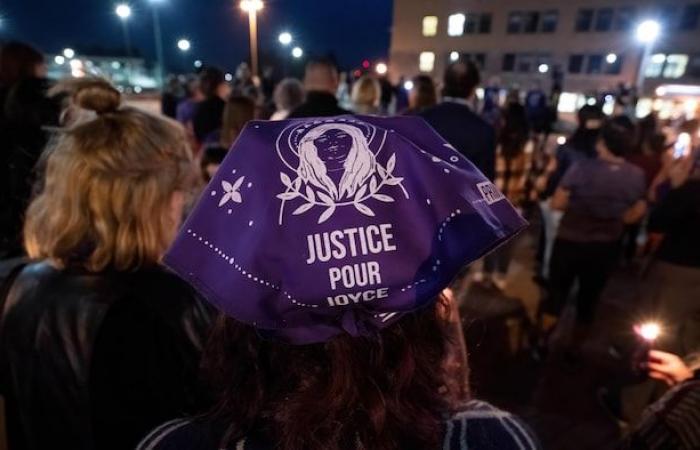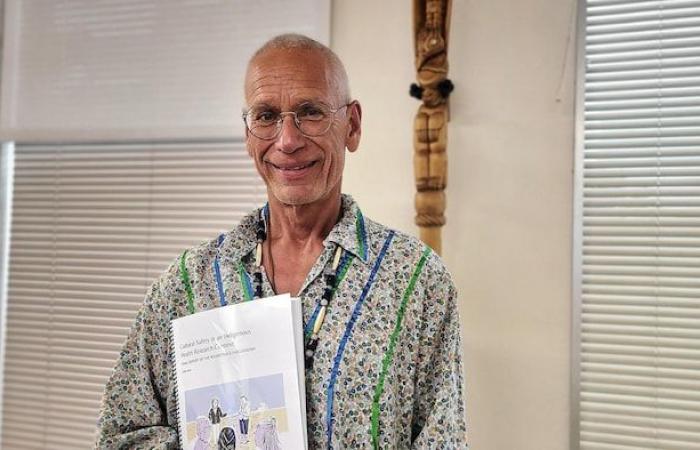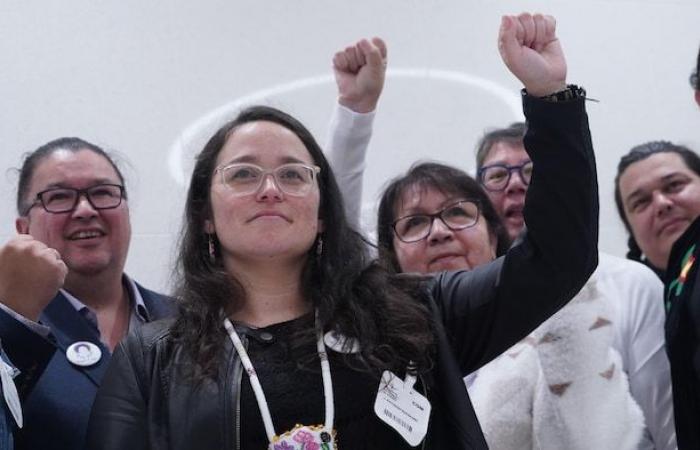Four years ago today, Joyce Echaquan, a 37-year-old Atikamekw mother, was dying under insults from staff at the Joliette hospital. To commemorate his death, dozens of people gathered at Place du Canada in downtown Montreal on Saturday afternoon.
People, both members of the Atikamekw community and non-Indigenous allies, were invited to light a small lantern in his memory and to give a few speeches.
Four years later, the emotions are still present in relation to sadness but especially anger
indicated Sipi Flamand, leader of the Atikamekw community of Manawan.
We are faced with several situations that seem to require a compromise, but it is often on our side [le compromis]rarely on the government side.
Many people wore purple sweaters or scarves, Joyce’s favorite color.
Open in full screen mode
Since this tragic event, Indigenous activists have dreamed of a health and social service system in which Indigenous people would feel respected and safe.
Photo : Radio-Canada / Ivanoh Demers
Other vigils are also organized near Joliette and Trois-Rivières on Saturday evening.
Joyce’s Principle
Since the death of Ms. Echaquan, Indigenous activists have dreamed of a health and social service system in which Indigenous people would feel respected and safe, but the work is progressing at a snail’s pace.
The right of equitable access, without any discrimination, to all social and health services, as well as the right to enjoy the best possible state of physical, mental, emotional and spiritual health
for Indigenous people, this is what the defenders of the Joyce Principle want to establish, a call to action launched following the events of September 28, 2020.
For Alex McComber, Mohawk from Kahnawake and assistant professor of family medicine at McGill University, there is no way to implement Joyce’s Principle quickly: it takes time
. Indeed, according to him, it will only take root when Indigenous people have had the opportunity to fully tell their story to the leaders of governments, professional orders as well as health and educational establishments.
We want to tell our story – not that of the colonizers – and say who we are with our own voices
he adds.
And this story must be heard and understood by all employees of the health system, from the attendant to the director of the establishment, argue the defenders of the Principle. This is their opportunity to start changing their perceptions, says McComber, so they can provide comprehensive and respectful medical care.
Open in full screen mode
Alex McComber is director of a mentoring network that brings together non-Indigenous and Indigenous researchers, who can discuss health and Indigenous know-how. (Archive photo)
Photo: Radio-Canada / Simon Filiatrault
Indigenous people are being disrespected in a system meant to help them heal
he recalls, recalling the story of Brian Sinclair, who died in the emergency room of the Winnipeg Health Sciences Center in 2008 after waiting 34 hours without receiving care.
At McGill University, the Joyce Principle is beginning to take hold in several departments, notes Mr. McComber. These first steps are significant
he admits.
For him, listening and openness from students and new generations of health professionals makes the task easier and gives hope. However, it is more difficult with seasoned health professionals, because their habits are firmly established
.
We must open discussions, as equals, with open, patient and attentive interlocutors.
The only indicator of the cultural security of the health network is indigenous patients, insists Alex McComber.
The objective will be achieved not only when learners recognize that they have learned
but above all when Indigenous patients say they feel safe and that they feel respected
he believes.
An open door?
The Quebec government is working on a bill that focuses on cultural security in the health and social services network, but it has been heavily criticized by Indigenous communities. They criticized the government for not having consulted them and for perpetuating colonial practices which, according to them, are the essence of the insecurity of Aboriginal people in the system.
In this context, the Office of the Joyce Principle slammed the door on the public hearings of the National Assembly in the face of the refusal to recognize systemic racism and adopt the Principle.

Open in full screen mode
The director of the Office of the Joyce Principle, Jennifer Petiquay-Dufresne, accompanied by other indigenous representatives in Quebec.
Photo : Radio-Canada / Sylvain Roy-Roussel
We must work together at the drawing board in a nation-to-nation relationship on this bill if we want to send a clear message to Indigenous users, many of whom are still afraid of obtaining the care that their condition requires.
the Office then explained.
The chief of the Assembly of First Nations Quebec-Labrador, Ghislain Picard, refused to participate in the public hearings. Once again, the government of Quebec arrogates to itself the power to legislate on a subject that falls within the jurisdiction of our First Nations governments
he wrote in an open letter.
For now, the government’s consultations are insignificant and insulting
says Alex McComber bluntly. It’s just window dressing to tick boxes.
When work resumed this fall, the parliamentarians took the initiative to go beyond the political framework to organize an informal and non-partisan meeting with the representatives of indigenous organizations still present.
This approach could make the text of the law more acceptable to certain indigenous representatives, parliamentarians hope. The Office of the Joyce Principle said it was open to do things together differently
when leaving the hearings.
The Legault government still does not recognize the existence of systemic racism in its institutions.
With information from Jean-Philippe Hughes








